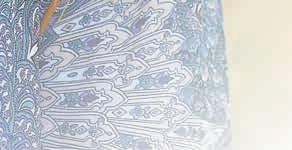
7 minute read
HEALING FROM GRIEF
Four Ways to Find Peace
by Jasmin Jenkins
Advertisement
When I was 13, my mom was diagnosed with ovarian cancer. At 15, I was at her graveside, navigating my fi rst experience with the other side of love: loss. Ten years later, my beloved and only brother died tragically as a result of PTSD and untreated addiction. In a word: suicide. Where my mom’s death silenced me, my brother’s death pushed me into a deep pursuit of healing.
In the nine years since then, I have committed to discovering the light side of grief, to identifying and embracing the invitations that lay within its deep layers. What I’ve come to learn is that grieving is actually a renewal state—a cycle of releasing and reconnecting. Th e tears and sadness are, quite literally, just a more fl uid connection to love. Th ese are the four invitations I’ve found within the grief:
1The invitation to pause When someone we love dies, our whole world changes in an instant and forever. And with this disruption, there is an opportunity for sacred inquiry that arrives as we pause and honor the absence of our loved one: the impressions they made on our lives, what we will miss about them, how we will continue to celebrate their lives and what their story taught us.
kissedbythegods/Pexels.com 2The invitation to connect with our breath With the intensity of emotions surrounding loss, breath can serve as our anchor. Simply remembering to close our eyes and breathe allows us to stay grounded in our body, mind and spirit. In the TED talk “Breathe to Heal,” Max Strom explains how certain patterns of breathing can actually change how we feel.
3The invitation to feel Elizabeth Kübler–Ross taught us about the fi ve stages of grief, but since everyone’s story and process is so unique, there is ultimately no linear order of the stages. If an emotion arises, allow for it. Feelings, aft er all, are just information about the state of our heart. Th e more we can give ourselves permission to be with where we are in our grief, the more at peace we will be in our process.
4The invitation to heal Healing is a verb requiring action and commitment. We have to allow for the pain to heal, also remembering that in doing so, we must keep our hearts open. We have to ask for help when healing, because most of us can’t heal in isolation. Th erapists who specialize in grief, online grief courses, bodywork and support groups can help us move forward.
Zen Buddhism reminds us that the obstacle is the path. By exploring these invitations, we arrive at the truth that grief is actually a sacred pathway into a deeper connection within our hearts.
Jasmin Jenkins is a Los Angeles-based integrative grief guide and the founder of Fall Up, which supports people navigating the spectrum of grief. Learn more at WeFallUp.com.
Getting Pregnant
Lifestyle Strategies to Boost Fertility

by Ronica O’Hara

More than 7 million American women face one of life’s deepest heartbreaks: They want a newborn in their arms, but their bodies are not cooperating. Happily, the growing use of natural approaches like healthier diets, supplements and acupuncture is changing that outcome for many.




When Rebecca Fett was told at age 26 that she had “incredibly low odds” of being able to conceive with her own eggs, she used her biochemistry and genetics training to plunge into research on egg quality and fertility. By taking targeted supplements, upgrading her diet and detoxing her house of harmful chemicals, the result was not only two healthy baby boys, but a book entitled It Starts with the Egg: How the Science of Egg Quality Can Help You Get Pregnant Naturally, Prevent Miscarriage, and Improve Your Odds in IV.
It sells at the fast clip of about 600 copies a week, showing that even amidst the traumas of the pandemic, couples fervently want to bear children. Some doula groups on the East Coast report a 30 percent rise in early 2021 births, and sperm banks are running so low that sperm from a handsome new donor posted online can be bought out within hours, reports Th e New York Times. “Th ere is nothing more hopeful than the creation of a new life,” says Randine Lewis, who used acupuncture and Chinese herbs to enable a hard-won pregnancy and then wrote Th e Infertility Cure: Th e Ancient Chinese Wellness Program for Getting Pregnant and Having Healthy Babies.
Egg Matters
A healthy pregnancy depends on a healthy egg. Chromosomal abnormalities severely hamper fertilization and account for more than half of fi rst-trimester miscarriages. Yet, contrary to common belief, egg quality is not determined solely by a woman’s age: it can be highly infl uenced by her lifestyle choices and nutrients in the three-month window before an egg is fertilized, Fett advises. Based on the latest research, she off ers the following recommendations for women trying to conceive naturally or through such means as in vitro fertilization (IVF): Detox the diet. To manage critically important blood sugar and insulin levels, eat low-glycemic, nutrient-rich foods and avoid sugar, caffeine and alcohol. An organic, largely plant- and fish-based Mediterranean diet boosts fertility. Dutch researchers found that women following this diet before an IVF cycle had a 40 percent higher chance of becoming pregnant. Supplement correctly.Take a prenatal vitamin, vitamins C and E, ubiquinol and melatonin. For women with diagnosed low ovarian reserve, consider carefully dosed DHEA. Detox the house. Th e Bisphenol A (BPA) in many household items and the phthalates in most scented products are endocrine disrupters that increase the risk of infertility and miscarriages, numerous studies show. Exchange plastic storage containers and water bottles for glass or stainless steel ones. Steer clear of fast food and processed food. Buy milk, oil, drinks and condiments in glass bottles rather than plastic ones. In the bathroom, toss hairspray, perfume and nail polish, and be wary of scented skin care products, air fresheners and detergents. Use non-toxic cleaning products.


Taking a different tack, “Traditional Chinese Medicine (TCM) does not focus on forcing maximum egg production,” says Lewis. “We improve the quality and receptivity of the entire body, mind and spirit, and the reproductive physiology responds.”
TCM involves identifying imbalances in the body that are creating obstacles to pregnancy and then using acupuncture, herbs and diet to restore full health. Diagnosis is typically done by an acupuncturist or Chinese medicine doctor. (To fi nd one locally, Lewis suggests asking pointedly, “How many cases of infertility have you been successful in resolving?”)
According to Lewis, self-diagnosis can also work. For example, sore breasts and irritability during ovulation can signify liver qi stagnation, and can be relieved by massaging certain acupressure points, taking black cohosh and meditating or doing yoga. General TCM strategies include: Acupuncture: Regular treatments “can stimulate the body’s hormonal system to do what it is supposed to: secrete the right hormones at the right time in a woman’s cycle,” says Lewis. Self-administered acupressure also works. Diet: Choose organic foods and hormonefree meats, and eat veggies cooked rather than raw. Nix caff eine, nicotine and alcohol. Supplements: Besides a high-potency, multivitamin-mineral complex, such nutrients as bee pollen, blue-green algae, wheatgrass, vitamin B6, CoQ10 and folic acid are oft en useful. Herbs: Specifi c herbal concoctions and powders can target imbalances and defi ciencies at key points in the menstrual cycle. Stress-busters: Qigong breathing lowers stress, and nightly warm foot soaks increase blood fl ow to the pelvic organs.
“As we live more harmoniously, our fertility improves,” says Lewis. “It is vastly wise and responds to how we live, think, act and relate.”
Natural health writer Ronica O’Hara can be contacted at OHaraRonica@gmail.com. Although researchers have long focused on female infertility, studies now show that for 40 percent of infertile couples, the problem lies in male sperm that is too sparse, slow, damaged or misshapen. Many of the strategies that improve egg quality also improve sperm quality, researchers are learning. Th is includes a healthier diet with more antioxidants, supplements that include a multivitamin and ubiquinol, detoxing the home and workplace of chemicals, cutting out smoking and lowering or stopping alcohol use. Other strategies include: Acupuncture to improve the concentration, volume and motility of sperm. Tossing lubricants with ingredients like petroleum, propylene glycol, glycerin, parabens, silicone and Nonoxynol-9 that hamper sperm movement and viability. Keeping cell phones out of side pockets. A Cleveland Clinic study found that pocketing cellphones more than four hours daily reduces sperm count, motility and viability. Wearing boxer shorts instead of briefs and forgoing hot tubs to keep testes temperatures low for sperm production. Exercising just enough. Studies show that men who exercise regularly, but not too extremely, have higher testosterone levels and better semen quality.






